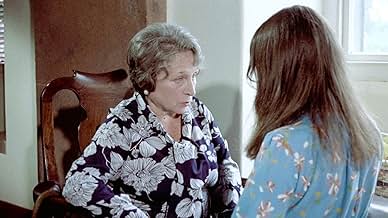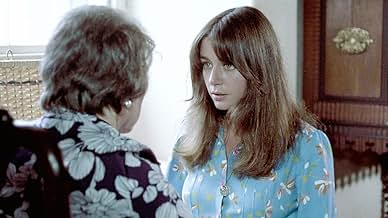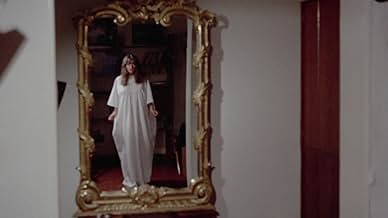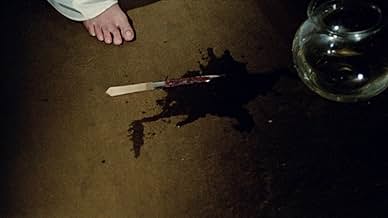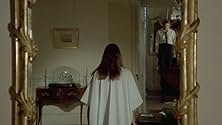Una cantante di discoteca è perseguitata dal fantasma del suo defunto padre. Il morto la evoca attraverso uno specchio, costringendola a commettere una serie di crimini violenti.Una cantante di discoteca è perseguitata dal fantasma del suo defunto padre. Il morto la evoca attraverso uno specchio, costringendola a commettere una serie di crimini violenti.Una cantante di discoteca è perseguitata dal fantasma del suo defunto padre. Il morto la evoca attraverso uno specchio, costringendola a commettere una serie di crimini violenti.
- Premi
- 1 vittoria in totale
Robert Woods
- Bill
- (as Robert Wood)
Françoise Brion
- Carla
- (as Francoise Brion)
Alice Arno
- Tina
- (as Alice Arnó)
María Bassó
- Elvira
- (as Maria Bassó)
Ada Tauler
- Stefania
- (as Adela Tauler)
Chantal Broquet
- Angela
- (non citato nei titoli originali)
Carmen Carbonell
- Tante
- (non citato nei titoli originali)
Jesús Franco
- Roger
- (non citato nei titoli originali)
Nicole Guettard
- Gloria
- (non citato nei titoli originali)
Monica Swinn
- Marie's Girlfriend (French version only)
- (non citato nei titoli originali)
Recensioni in evidenza
Before I get into the review, here are my ratings for the movie.
The story gets 0.25 out of 2: The Direction a 0.75: The Pacing receives a 0.75: While the Acting gets 1.00: And my Enjoyment level earns a 0.75 out of 2: This brings the total for The Obscene Mirror to 3.5 out of 10.
I enjoyed Jesus Franco's version of Dracula, so when I came across this title, well, I had to give a viewing, didn't I? Let this be a lesson to me, just because a director has one good film under his belt doesn't mean they are all going to be to the same calibre. In fact, this story is woefully lacking in everything.
Now, listen to this premise: A Nightclub singer is haunted by the ghost of her dead father. A father who was so oppressive and domineering that he couldn't accept his daughter loved another man and so commits suicide on her wedding day. However, this is just the start of her nightmare. Not only does he and his death torment her, but is he forcing her to commit murder?
Doesn't this sound great? It did to me. I envisioned a dark and moody supernatural thriller filled with imagery and eeriness. Regrettably, the writers, Nicole Guettard and Jesus Franco, took a more moralistic view. The whole story has a pretentiousness to it. Guettard and Franco are pushing the differences between sexual equality. I love a good morality tale, but sadly they attack the issues with a heavy hand. And, hardly touch on the more supernatural elements of the story. We spend too much time on self-centred blokes waxing lyrical on how macho and "in-touch" with their feelings they are. One character even gives us a five minute narrative on the history of men in the region.
What this story needed was a much better structure. A better balance of morality and suspense.
I did learn one thing, though. A foreign language film with subtitles is way more boring if you have to read the drivel the characters are spouting. The act of reading forces you into the story more. You have to make the physical effort. When you're listening you can listen with half an ear... just like you do with your spouse.
I even believe the direction the story took hindered Franco in his directing. There's nothing eerie in this movie. It's a suspense-less thriller, and that is death for this style of movie. If the story is weak, the director has to step up to the plate and give the audience something interesting to watch. Alas, Franco opts for a basic, and below average, point and shoot style. By the twentieth minute, my attention was wavering. Luckily, the "history of men" comes towards the end of the movie, by which time, you think, oh well, may as well see it through to the end. Franco isn't too good with pacing. I think he got lucky with Dracula as his one-pace style worked in the confines of that story. Here, however, it only adds to the tediousness of the picture.
The acting is the best part of this film. Don't get me wrong though, the acting is still only average. This comes down to some of the characters being underused and poorly constructed. We needed to see why Ana was the way she was towards men. We are told her father wasn't great, but we are never really shown this. We needed more on this relationship and more on Ana's mental health and well being. The cast do well with what they are given. It's a shame they're not given much. And, if they are, it's generally drivel.
If you thought, upon reading the synopsis, that this movie would be a great film to watch, you have been warned. I cannot, in all faith recommend this nonsense to anyone. And, in all truth, I would suggest staying as far away from this Obscene Mirror as possible.
Now, smash that mirror and jog on over to my Absolute Horror and Killer Thriller Chillers and The Game Is Afoot lists to see where this claptrap crashed in my rankings. At the very least, you should be able to find something better to watch.
Take Care & Stay Well.
The story gets 0.25 out of 2: The Direction a 0.75: The Pacing receives a 0.75: While the Acting gets 1.00: And my Enjoyment level earns a 0.75 out of 2: This brings the total for The Obscene Mirror to 3.5 out of 10.
I enjoyed Jesus Franco's version of Dracula, so when I came across this title, well, I had to give a viewing, didn't I? Let this be a lesson to me, just because a director has one good film under his belt doesn't mean they are all going to be to the same calibre. In fact, this story is woefully lacking in everything.
Now, listen to this premise: A Nightclub singer is haunted by the ghost of her dead father. A father who was so oppressive and domineering that he couldn't accept his daughter loved another man and so commits suicide on her wedding day. However, this is just the start of her nightmare. Not only does he and his death torment her, but is he forcing her to commit murder?
Doesn't this sound great? It did to me. I envisioned a dark and moody supernatural thriller filled with imagery and eeriness. Regrettably, the writers, Nicole Guettard and Jesus Franco, took a more moralistic view. The whole story has a pretentiousness to it. Guettard and Franco are pushing the differences between sexual equality. I love a good morality tale, but sadly they attack the issues with a heavy hand. And, hardly touch on the more supernatural elements of the story. We spend too much time on self-centred blokes waxing lyrical on how macho and "in-touch" with their feelings they are. One character even gives us a five minute narrative on the history of men in the region.
What this story needed was a much better structure. A better balance of morality and suspense.
I did learn one thing, though. A foreign language film with subtitles is way more boring if you have to read the drivel the characters are spouting. The act of reading forces you into the story more. You have to make the physical effort. When you're listening you can listen with half an ear... just like you do with your spouse.
I even believe the direction the story took hindered Franco in his directing. There's nothing eerie in this movie. It's a suspense-less thriller, and that is death for this style of movie. If the story is weak, the director has to step up to the plate and give the audience something interesting to watch. Alas, Franco opts for a basic, and below average, point and shoot style. By the twentieth minute, my attention was wavering. Luckily, the "history of men" comes towards the end of the movie, by which time, you think, oh well, may as well see it through to the end. Franco isn't too good with pacing. I think he got lucky with Dracula as his one-pace style worked in the confines of that story. Here, however, it only adds to the tediousness of the picture.
The acting is the best part of this film. Don't get me wrong though, the acting is still only average. This comes down to some of the characters being underused and poorly constructed. We needed to see why Ana was the way she was towards men. We are told her father wasn't great, but we are never really shown this. We needed more on this relationship and more on Ana's mental health and well being. The cast do well with what they are given. It's a shame they're not given much. And, if they are, it's generally drivel.
If you thought, upon reading the synopsis, that this movie would be a great film to watch, you have been warned. I cannot, in all faith recommend this nonsense to anyone. And, in all truth, I would suggest staying as far away from this Obscene Mirror as possible.
Now, smash that mirror and jog on over to my Absolute Horror and Killer Thriller Chillers and The Game Is Afoot lists to see where this claptrap crashed in my rankings. At the very least, you should be able to find something better to watch.
Take Care & Stay Well.
Here is another of those elusive Franco films that in its proper context is neither horror, nor porn or sexploitation, in spite of the hardcore inserts, but wandering around urges.
Now I appreciate Franco in the way you do with a friend or co-worker you have known forever. I appreciate him, in part, because of how familiar his flaws and habits. So I won't mollycoddle him or pretend in his face: he was often sloppy, charmless as a thinker and embarrassing in a number of ways. Whereas some fans read profundity in this film, for me all the stuff about mirrors, madness and theater as staged inner life are as sophomoric as it gets, for instance that whispers of a damaged mind will issue from a mirror.
Let me say here that it's not the elements themselves, which others like Rivette, Resnais and Ruiz have used to similar effect, but the narrative distance they are placed away from the viewer, distance that leads up to them and away from.
But I accept it as part of the experience of shared intuition that is possible with a good friend; Franco is worth knowing because, going past conscious narrative impositions, I can relax in a fluid fabric of images which he seems to spontaneously stir up from life as he walks through it. The more of his films I watch, the more I relax because I have shared in previous travels.
It's all in the last scene here.
Leading up to it we have obviously layered madness about a woman reliving guilt from her past, inserts of incestual cunnilingus and hardcore sex (in the Italian version I saw), and relaxed wandering around bars and later exotic Madeira. As a whole the film evokes Franco's films with Soledad, She Killed in Ecstasy and Eugenie. It is not as 'pure' as Female Vampire, nor on the other hand as testing.
The idea, tremendously simple, is that a woman wanted to get married, but her beloved sister killed herself out of desperation and perhaps spurned love, and she carries this burden in unfulfilled affairs with men.
The Spanish version without the inserts may flesh out the story a bit more, but story is not the main point, it's swimming across to where images acquire life of their own.
In the last scene we have all this, the wandering, madness, and repressed emotion, coalesce together in a beautiful way as a bridal veil fluttering in the wind.
Now I appreciate Franco in the way you do with a friend or co-worker you have known forever. I appreciate him, in part, because of how familiar his flaws and habits. So I won't mollycoddle him or pretend in his face: he was often sloppy, charmless as a thinker and embarrassing in a number of ways. Whereas some fans read profundity in this film, for me all the stuff about mirrors, madness and theater as staged inner life are as sophomoric as it gets, for instance that whispers of a damaged mind will issue from a mirror.
Let me say here that it's not the elements themselves, which others like Rivette, Resnais and Ruiz have used to similar effect, but the narrative distance they are placed away from the viewer, distance that leads up to them and away from.
But I accept it as part of the experience of shared intuition that is possible with a good friend; Franco is worth knowing because, going past conscious narrative impositions, I can relax in a fluid fabric of images which he seems to spontaneously stir up from life as he walks through it. The more of his films I watch, the more I relax because I have shared in previous travels.
It's all in the last scene here.
Leading up to it we have obviously layered madness about a woman reliving guilt from her past, inserts of incestual cunnilingus and hardcore sex (in the Italian version I saw), and relaxed wandering around bars and later exotic Madeira. As a whole the film evokes Franco's films with Soledad, She Killed in Ecstasy and Eugenie. It is not as 'pure' as Female Vampire, nor on the other hand as testing.
The idea, tremendously simple, is that a woman wanted to get married, but her beloved sister killed herself out of desperation and perhaps spurned love, and she carries this burden in unfulfilled affairs with men.
The Spanish version without the inserts may flesh out the story a bit more, but story is not the main point, it's swimming across to where images acquire life of their own.
In the last scene we have all this, the wandering, madness, and repressed emotion, coalesce together in a beautiful way as a bridal veil fluttering in the wind.
Ana (Emma Cohen) and her father (Howard Vernon) have always meant the world to each other but their idyllic life together shatters when the girl wants to get married and, going into his study to show him her wedding gown, she finds her dad dangling from the end of a rope. Devastated, Ana puts her piano skills to good use by running away to become a singer in a lounge band only to find the pain's inside. She's a beauty and men are interested but whenever Ana reciprocates, the image of her father's suicide appears to her in mirrors and she sees herself stabbing those men to death. Unfortunately, whenever that happens, she either hears or reads in the paper that the men really were murdered. Devastated again, Ana tries to commit suicide but her best friend intervenes and takes her to a beautiful island to rest and recuperate - the island where Ana and her father lived...
The Spanish version of this film is considered to be the "director's cut" and I don't know how personal the film was to Franco but I took it personally. There's a fairytale quality to this adult nightmare about guilt and the burdens of the past we all carry but since it sounds like an oxymoron to put "expertly realized" and Jess Franco in the same sentence, suffice it to say that THE OBSCENE MIRROR was downright hypnotic. So much so, I didn't mind the time it took to get where it was going -and it certainly took its time. There were too many non-essential musical interludes and the camera's meaningless meandering makes Franco the most frustrating director I've ever encountered. All the zoom-in, zoom-out, pan right, scan left would be OK if it meant something but doing that to a flower bed or a harbor? Not only that, he'd go in for a close-up on a patron in a nightclub audience and linger so long I felt the person was bound to become part of the story but, no, they were just extras. Credit must go not only to the screenplay but to the cinematographer because there were long stretches where the film didn't seem like it was being "directed" and was quite beautiful to contemplate. All I can say in defense of my 8/10 rating is "there's something about it".
The Spanish version of this film is considered to be the "director's cut" and I don't know how personal the film was to Franco but I took it personally. There's a fairytale quality to this adult nightmare about guilt and the burdens of the past we all carry but since it sounds like an oxymoron to put "expertly realized" and Jess Franco in the same sentence, suffice it to say that THE OBSCENE MIRROR was downright hypnotic. So much so, I didn't mind the time it took to get where it was going -and it certainly took its time. There were too many non-essential musical interludes and the camera's meaningless meandering makes Franco the most frustrating director I've ever encountered. All the zoom-in, zoom-out, pan right, scan left would be OK if it meant something but doing that to a flower bed or a harbor? Not only that, he'd go in for a close-up on a patron in a nightclub audience and linger so long I felt the person was bound to become part of the story but, no, they were just extras. Credit must go not only to the screenplay but to the cinematographer because there were long stretches where the film didn't seem like it was being "directed" and was quite beautiful to contemplate. All I can say in defense of my 8/10 rating is "there's something about it".
I've only seen about 15 Jess Franco films so far, which is actually saying very little considering the countless amount of films he made, and in spite of the beyond-awful conditions the print I watched had, "Al Otro Lado del Espejo" (which translates to English as "The Other Side of the Mirror") still managed to make a impression on me, and might as well be the finest Franco film I've seen so far. Coming straight after Soledad Miranda's death, and not unlike the interesting but deeply flawed "A Virgin Among the Living Dead", this one is a haunting, beautiful study on death and grief, that "mirrors" Franco's own emotional breakdown after the death of his muse. The story stars Emma Cohen as Anna - a young bride-to-be who suffers a breakdown after her father (Franco-regular Howard Vernon) commits suicide on the eve of her wedding. She then starts having visions of her father through mirrors, beckoning her, and soon enough, goes on a killing spree against the men who sexually arouse her. The script is very cleverly written, with well developed characters that you actually care for, as well as being filled with Greek-mythology symbolism and Freudian motifs. Franco also benefits largely from having one of the best actresses he ever worked with playing the lead role. Cohen has that same innocents, doe-eyed beauty of Jessica Harper in "Suspiria", and gives one harrowing, psychotic and ultimately hearth-breaking performance as our grieving protagonist. The music, as usual for a Franco film, has great importance within the context of the film (since Anna is a nightclub singer who often "escapes" from her hectic life by entering into a "purely musical" state of mind), and composer Adolfo Waitzman (who also scored the same year's "A Bell from Hell" and the underrated "Pensione Paura") just nails it with a wonderful jazzy score. Another great aspect of the film is that this is probably the first Franco film that was actually creeped me out, and predates "Candyman" for almost 30 as far as "making mirrors scary as Hell" is concerned. Although the version I saw of this film was in a terrible state and was actually hard to watch at times, the cinematography appeared to be quite good, thus making it even sadder that it isn't available in a remastered, polished DVD. Speaking of which, the film is only available (this cut, at least) in Spanish with no subtitles, but since this is a very visual film (and if you know the main plot beforehand), it's not hard to figure out what's going on. The major problem with this film is that it starts quite well, but looses steam in between the end of the second act and beginning of the third, as Franco seemingly forgets he is a doing a horror film and just throws a series of non-stop, dull "jam sessions" that, though somewhat relevant to the plot, go on for a bit too long, ruining the oppressive atmosphere it had been building for so long. Thankfully, the film gets it's steam back at the ending, which remains the most powerful, twisted and just plain haunting I've seen in a Franco film. Overall, a brilliant gem of Spanish horror film that, though not for everyone, is essential viewing for fans of Eurohorror and Jess Franco alike. 9/10 Be aware, however, that the film is available in three different versions. The original Spanish cut, which is the version I've seen and the one Franco prefers; the soft-core French version which replaces Howard Vernon for Lina Romay as Anna's dead nymphomaniac sister; and the hardcore Italian version that adds even more sex and sleaze to the French version. The last two versions, though I've never actually seen them, seemingly does to the film what "House of Exorcism" did to "Lisa and the Devil", totally butchering what the director was aiming for, and should be avoided unless you're a hardcore Franco fan.
This is a Jess Franco film which seems to have garnered something of a good reputation amongst the vast array of his output. While I perused through the user reviews here I couldn't help but wonder if I had seen the same film, as from the plot synopsis offered by many of these I found there were several very key things I couldn't recall even happening on screen. I soon discovered that the reason for this is that there are three versions of this movie - the Spanish being the definitive cut it seems – and I saw the Italian variant which, like several other Franco films from the period had been turned into an adult film by way of some hardcore scenes being spliced into the flow. I think it would be only fair to guess that this version is not the best out there and compromises Franco's original vision somewhat.
The story is about a woman who goes into a downward psychological spiral after the suicide of her sister. She subsequently sees visions of her dead sibling which leads her to go out and murder men.
One of the chief differences between the versions is that in the Spanish one it is her dead father (played by Franco regular Howard Vernon) who she sees from beyond the grave, as opposed to her sister in the Italian version. This change seems to have been made principally to allow for the introduction of Lina Romay who, in her role as the sister, spends the whole time frolicking around naked and is at the centre of all the hardcore scenes too. These scenes, incidentally, are fairly half-heartedly executed and seem to be there simply as a means of selling the movie as an adult feature. However, unless I simply wasn't paying very good attention, this change also means that the whole mirror idea seems to have been more or less eradicated aside from a scene late on where it is smashed resulting in the breaking of the supernatural spell. Up to that point however, it seemed to me that all of this malarkey was going on in the head of the main actress, not playing out in an actual mirror! Despite these issues with the Italian version, this still made for interesting enough viewing. Despite its definite sexploitation angle, it is in essence quite a haunting tale. It's quite hard to reasonably categorize in actual fact because it has several feet in different sub-genres without truly focusing on one thread fully. I can only really comment on the version I have seen and going by that I couldn't put this in the upper bracket of Franco features; it's in the top half of his output though for sure. Like most of his films it has that rushed look and feel, while the production values are pretty limited. But it would seem that the Spanish version is the one to see if you want a proper reflection of this one's merits.
The story is about a woman who goes into a downward psychological spiral after the suicide of her sister. She subsequently sees visions of her dead sibling which leads her to go out and murder men.
One of the chief differences between the versions is that in the Spanish one it is her dead father (played by Franco regular Howard Vernon) who she sees from beyond the grave, as opposed to her sister in the Italian version. This change seems to have been made principally to allow for the introduction of Lina Romay who, in her role as the sister, spends the whole time frolicking around naked and is at the centre of all the hardcore scenes too. These scenes, incidentally, are fairly half-heartedly executed and seem to be there simply as a means of selling the movie as an adult feature. However, unless I simply wasn't paying very good attention, this change also means that the whole mirror idea seems to have been more or less eradicated aside from a scene late on where it is smashed resulting in the breaking of the supernatural spell. Up to that point however, it seemed to me that all of this malarkey was going on in the head of the main actress, not playing out in an actual mirror! Despite these issues with the Italian version, this still made for interesting enough viewing. Despite its definite sexploitation angle, it is in essence quite a haunting tale. It's quite hard to reasonably categorize in actual fact because it has several feet in different sub-genres without truly focusing on one thread fully. I can only really comment on the version I have seen and going by that I couldn't put this in the upper bracket of Franco features; it's in the top half of his output though for sure. Like most of his films it has that rushed look and feel, while the production values are pretty limited. But it would seem that the Spanish version is the one to see if you want a proper reflection of this one's merits.
Lo sapevi?
- BlooperIn the end credits of the Spanish version, Françoise Brion is credited as Carla and Alice Arno is credited as Tina but in the film, it's the other way around.
- ConnessioniReferenced in Franco Noir (2021)
I più visti
Accedi per valutare e creare un elenco di titoli salvati per ottenere consigli personalizzati
- How long is The Other Side of the Mirror?Powered by Alexa
Dettagli
- Data di uscita
- Paesi di origine
- Lingua
- Celebre anche come
- Lo specchio del piacere
- Luoghi delle riprese
- Lisbona, Portogallo(Exterior)
- Aziende produttrici
- Vedi altri crediti dell’azienda su IMDbPro
- Tempo di esecuzione1 ora 22 minuti
- Mix di suoni
- Proporzioni
- 1.85 : 1
Contribuisci a questa pagina
Suggerisci una modifica o aggiungi i contenuti mancanti

